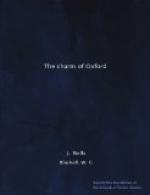LIST OF ILLUSTRATIONS
I Christ church, the
cathedral from the garden
II st. Mary’s spire
III view in Radcliffe square
IV Sheldonian theatre, etc.,
Broad street
V balliol college, broad
street front
VI Merton college, the tower
VII Merton college, the library
Interior
VIII oriel college and st. Mary’s
church
IX high street
X new college, the entrance
gateway
XI new college, the tower
XII Lincoln college, the chapel
Interior
XIII Magdalen tower
XIV Magdalen college, the open air
pulpit
XV brasenose college, quadrangle
and the Radcliffe library
XVI Corpus Christi college, the
first quadrangle
XVII Christ church, the cathedral from
the meadow
XVIII Christ church, the hall staircase
XIX Christ church, the hall Interior
XX Christ church, “Tom”
Tower
XXI st. John’s college garden
front
XXII Wadham college, the chapel from the
garden
XXIII Wadham college, the hall Interior
XXIV Hertford college, the bridge
XXV st. Peter-in-the-east church
and st. Edmund hall
XXVI Iffley, the old Mill
Oxford from
the east [End papers]
INTRODUCTION
In what does the charm of Oxford consist? Why does she stand out among the cities of the world as one of those most deserving a visit? It can hardly be said to be for the beauty of her natural surroundings. In spite of the charm of her
“Rivers twain of gentle
foot that pass
Through the rich meadow-land
of long green grass,”
in spite of her trees and gardens, which attract a visitor, especially one from the more barren north, Oxford must yield the palm of natural beauty to many English towns, not to mention those more remote.
But she has every other claim, and first, perhaps, may be mentioned that of historic interest.
An Englishman who knows anything of history is not likely to forget of how many striking events in the development of his country Oxford has been the scene. The element of romance is furnished early in her story by the daring escape of the Empress-Queen, Matilda, from Oxford Castle. The Provisions of Oxford (1258) were the work of one of the most famous Parliaments of the thirteenth century, the century which saw the building of the English constitution, and the students of the University fought for the cause which those Provisions represented. The burning of the martyr bishops in the sixteenth century is one of the greatest tragedies in the story of our Church. The seventeenth century saw Oxford the capital of Royalist England in the Civil War, and though there was no actual fighting there, Charles’ night march in 1644 from Oxford to the West, between the two enclosing armies of Essex and Waller, is one of the most famous military movements




